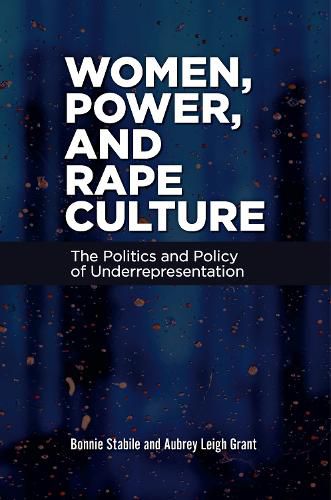Readings Newsletter
Become a Readings Member to make your shopping experience even easier.
Sign in or sign up for free!
You’re not far away from qualifying for FREE standard shipping within Australia
You’ve qualified for FREE standard shipping within Australia
The cart is loading…






Focusing on how rape, sexual assault, and harassment relate to underrepresentation of women in public authority, this book provides an insightful exploration of the policy context that impedes women’s advancement to positions of power.
The election of Donald Trump precipitated one of the largest outpourings of political protest on a single day in U.S. history with the 2017 March for Women. The emboldened #MeToo and #TimesUp movements reacted not only to the historical injustice of sexual offenses perpetrated upon women, but women’s associated underrepresentation in positions of power and public authority.
Women, Power, and Rape Culture examines the principal events, actors, and paradigms in the politics of rape, sexual assault, and harassment since Trump’s election. Unlike other studies, it connects these traumatic events to women’s underrepresentation in the public sphere. Chapters consider the power of presidential speech, judges, and Congress to create structural barriers to women’s representation as well as the stultifying effects of weak college and university responses to sexual violence. Disparities in women’s representation in positions of public authority are considered in light of the disproportionate burden imposed on women by a culture that discounts the prevalence of rape and harassment and by the policies that inadequately address them, allowing them to perpetuate.
Explains how U.S. politics and public policy are intimately connected to rape, assault, and sexual harassment
Describes how political rhetoric in social media can contribute to women’s continuing relative silence and underrepresentation in the public sphere
Examines the influence of judicial decisions shaped by justices who themselves have been credibly accused of sexual assault
Highlights the congressional context where women are underrepresented in the most powerful positions, overrepresented in support roles, and systematically subjected to sexual harassment and misconduct that has been inadequately acknowledged or addressed
Considers the importance of the campus context in setting the stage for women’s underrepresentation by perpetuating unjust outcomes in pervasive cases of campus sexual assault and harassment
$9.00 standard shipping within Australia
FREE standard shipping within Australia for orders over $100.00
Express & International shipping calculated at checkout
Focusing on how rape, sexual assault, and harassment relate to underrepresentation of women in public authority, this book provides an insightful exploration of the policy context that impedes women’s advancement to positions of power.
The election of Donald Trump precipitated one of the largest outpourings of political protest on a single day in U.S. history with the 2017 March for Women. The emboldened #MeToo and #TimesUp movements reacted not only to the historical injustice of sexual offenses perpetrated upon women, but women’s associated underrepresentation in positions of power and public authority.
Women, Power, and Rape Culture examines the principal events, actors, and paradigms in the politics of rape, sexual assault, and harassment since Trump’s election. Unlike other studies, it connects these traumatic events to women’s underrepresentation in the public sphere. Chapters consider the power of presidential speech, judges, and Congress to create structural barriers to women’s representation as well as the stultifying effects of weak college and university responses to sexual violence. Disparities in women’s representation in positions of public authority are considered in light of the disproportionate burden imposed on women by a culture that discounts the prevalence of rape and harassment and by the policies that inadequately address them, allowing them to perpetuate.
Explains how U.S. politics and public policy are intimately connected to rape, assault, and sexual harassment
Describes how political rhetoric in social media can contribute to women’s continuing relative silence and underrepresentation in the public sphere
Examines the influence of judicial decisions shaped by justices who themselves have been credibly accused of sexual assault
Highlights the congressional context where women are underrepresented in the most powerful positions, overrepresented in support roles, and systematically subjected to sexual harassment and misconduct that has been inadequately acknowledged or addressed
Considers the importance of the campus context in setting the stage for women’s underrepresentation by perpetuating unjust outcomes in pervasive cases of campus sexual assault and harassment